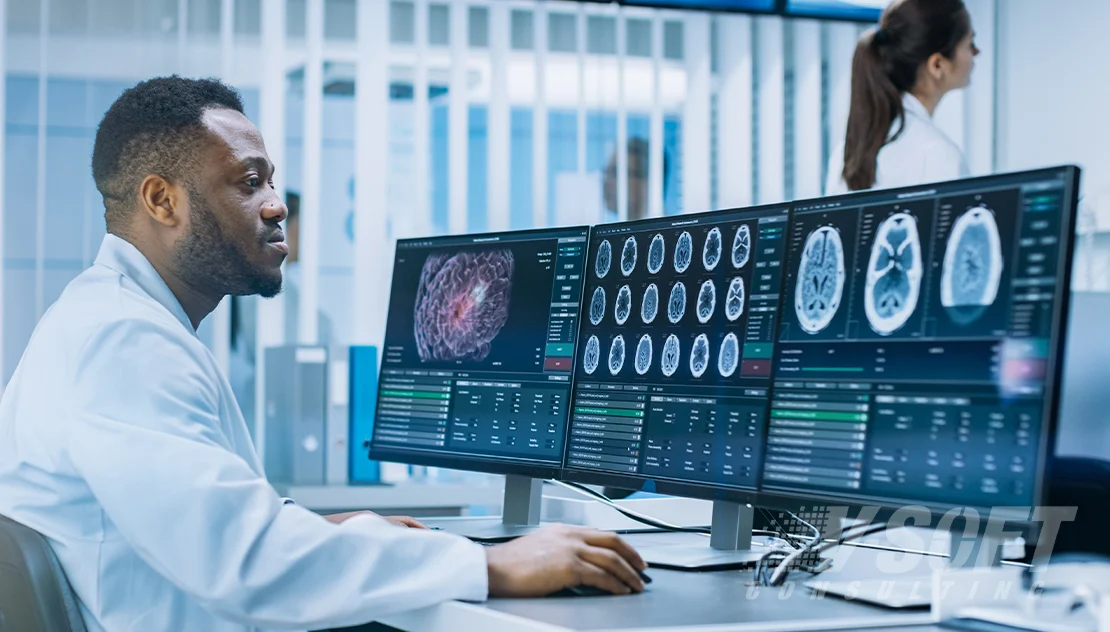
Revolutionizing Healthcare: The Profound Use of AI in Healthcare
Introduction
Technology and healthcare have converged in the modern era to create a transformation that has never been seen before. AI in healthcare has emerged as an innovation beacon, transforming healthcare diagnosis, treatment, and patient care for the better. In a world once viewed as science fiction, this synergy has opened doors to new possibilities.
Understanding the Use of AI in Healthcare
From revolutionizing diagnostic procedures to enhancing patient experiences, AI is redefining the very essence of medical practice as we know it. This century will be the year of AI in healthcare.
1.Precision Diagnostics and Disease Identification
AI has ushered in a new era of precision diagnostics through its ability to analyze vast amounts of clinical data at unparalleled speeds. The AI algorithms can identify patterns, anomalies, and trends that may be hidden from the human eye within images and patient records. Early detection and accurate diagnosis of diseases, ranging from cancer to cardiovascular conditions, have been greatly aided by this capability.
2. Personalized Treatment Plans
AI integration into healthcare has allowed customized treatment plans to be created based on genetic makeup, medical history, and lifestyle choices, thereby revolutionizing patient care. Personalized treatment not only enhances treatment efficacy; also minimizes adverse effects.
3. Drug Discovery and Development
In the journey from molecule to medicine, the process is lengthy and complex, but artificial intelligence is accelerating the process dramatically. Using artificial intelligence, drug discovery is expedited and development time and resources are reduced because AI sifts through extensive chemical compound databases and predicts their interactions.
4. Remote Monitoring and Predictive Analytics
It is not only possible to monitor patients in real-time with remote patient monitoring, powered by AI, that extends beyond clinics and hospitals. The predictive analytics then take the initiative by detecting subtle changes that indicate a potential health issue and enabling proactive action.
5. Enhancing Patient Experience
Healthcare settings are increasingly utilizing AI-driven chatbots and virtual assistants. Patients can utilize them to access information, schedule appointments, and receive personalized guidance. By streamlining administrative processes, patients are informed and engaged in their healthcare journey, as well as enhancing their satisfaction.
Challenges and Ethical Considerations
A major challenge with integrating AI into healthcare is data privacy, security, and biases in AI algorithms, which must be carefully considered. Taking advantage of artificial intelligence’s full potential for healthcare requires striking a balance between technological innovation and ethical responsibility.
The Future Landscape of Healthcare
Despite the trail AI is blazing in healthcare, the trajectory points towards an era where human expertise and AI harmoniously coexist, enhancing medical expertise. In addition to accelerating medical advances, AI-human partnerships will redefine medical research and provide more efficient and patient-centric care through their collaborative potential.
Conclusion
From precision diagnostics to personalized treatments, artificial intelligence is omnipresent and transformative in healthcare. It is not just a trend; it is an evolutionary leap. Keeping ethical considerations and responsible innovation in mind as we traverse this uncharted territory is crucial.
Our blog post in this series explores the innovative uses of artificial intelligence in healthcare. The impact of AI on precision diagnostics, personalized treatment plans, drug discovery, remote monitoring, and patient experiences is as remarkable as it is wonderful. For AI to revolutionize healthcare successfully, we must think about responsible innovation and ethical considerations as we embark on this transformative journey.